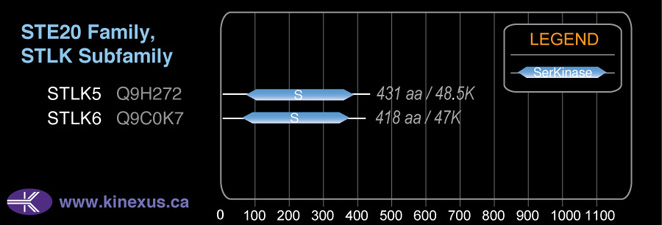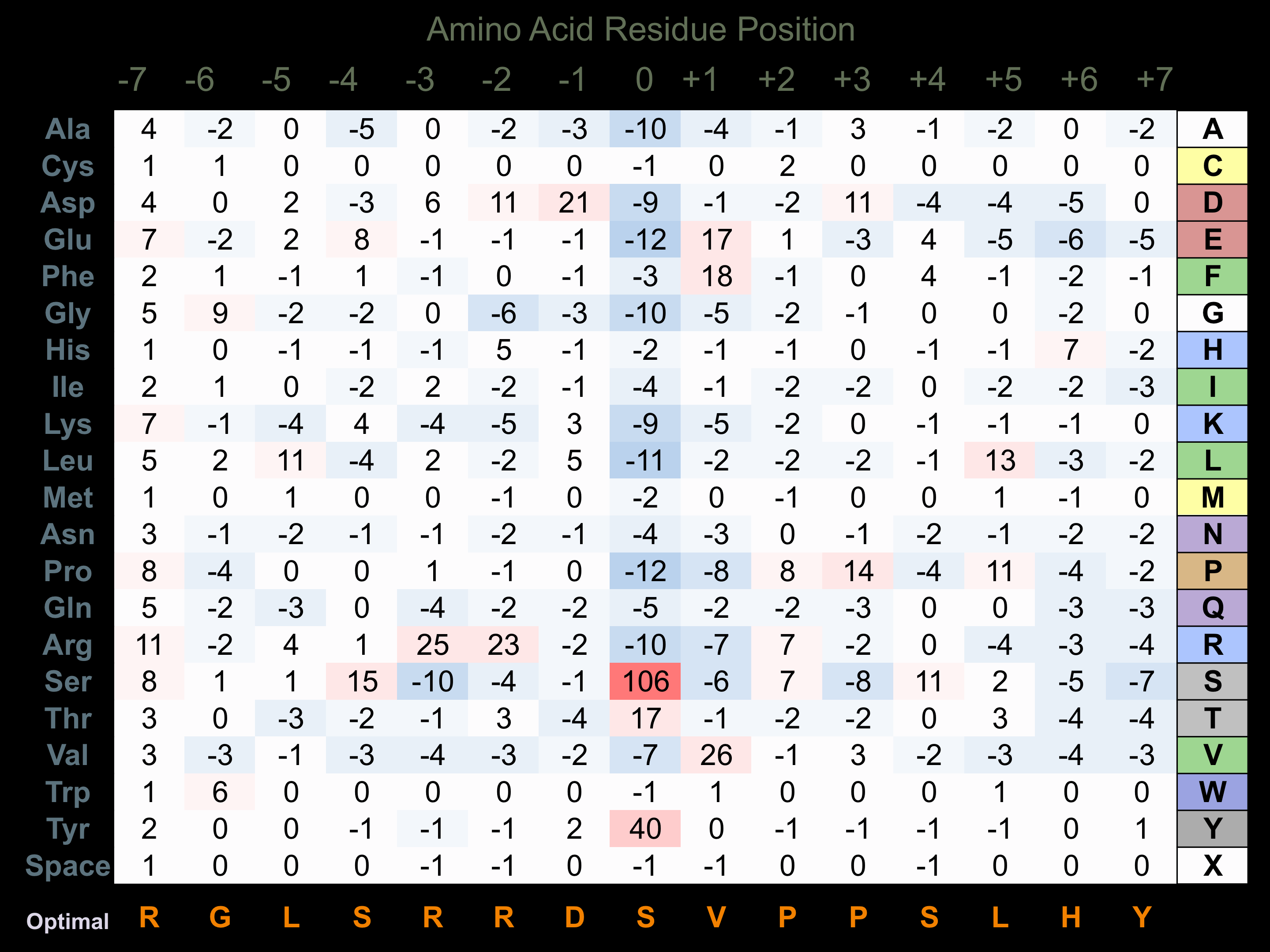Nomenclature
Short Name:
STLK5
Full Name:
Serologically defined breast cancer antigen NY-BR-96
Alias:
- LYK5
- Serologically defined breast cancer antigen NY-BR-96
- STE20-related adapter protein
- STRAD alpha
Classification
Type:
Protein-serine/threonine kinase
Group:
STE
Family:
STE20
SubFamily:
STLK
Structure
Mol. Mass (Da):
48,369
# Amino Acids:
431
# mRNA Isoforms:
6
mRNA Isoforms:
48,369 Da (431 AA; Q7RTN6); 43,962 Da (394 AA; Q7RTN6-3); 41,701 Da (373 AA; Q7RTN6-5); 38,597 Da (348 AA; Q7RTN6-2); 34,625 Da (314 AA; Q7RTN6-6); 33,277 Da (299 AA; Q7RTN6-4)
4D Structure:
NA
1D Structure:
3D Image (rendered using PV Viewer):
PDB ID
Subfamily Alignment

Domain Distribution:
| Start | End | Domain |
|---|---|---|
| 69 | 379 | Pkinase |
Post-translation Modifications
For detailed information on phosphorylation of this kinase go to PhosphoNET
Serine phosphorylated:
S2, S46, S49, S52, S313.
Threonine phosphorylated:
T42, T329, T398, T419.
Ubiquitinated:
K239.
Distribution
Based on gene microarray analysis from the NCBI
Human Tissue Distribution
% Max Expression:
Mean Expression:
Number of Samples:
Standard Deviation:
% Max Expression:
Mean Expression:
Number of Samples:
Standard Deviation:
 98
98
1126
41
1021
 15
15
177
15
166
 21
21
241
2
148
 40
40
457
131
653
 63
63
724
42
561
 9
9
102
92
79
 4
4
47
47
59
 92
92
1065
30
1294
 31
31
360
17
256
 12
12
144
87
190
 18
18
204
21
215
 88
88
1013
146
688
 16
16
179
24
88
 12
12
140
9
129
 15
15
171
15
199
 10
10
120
24
121
 41
41
478
171
1968
 10
10
119
9
118
 11
11
131
89
118
 50
50
575
160
507
 33
33
379
13
519
 26
26
304
17
392
 19
19
214
4
165
 43
43
497
9
444
 32
32
368
13
586
 78
78
895
80
892
 14
14
160
27
99
 13
13
153
9
139
 15
15
171
9
151
 25
25
290
42
222
 71
71
820
36
699
 100
100
1153
46
1513
 4
4
42
58
42
 78
78
903
104
781
 99
99
1137
61
1219
Evolution
Species Conservation
PhosphoNET % Identity:
PhosphoNET % Similarity:
Homologene %
Identity:
PhosphoNET % Identity:
PhosphoNET % Similarity:
Homologene %
Identity:
 100
100
100
100 34.1
34.1
43.1
95 99.3
99.3
99.7
99 -
-
-
95 -
-
-
- 88.1
88.1
89.3
97 -
-
-
- 95.1
95.1
97.6
95 84.9
84.9
88.4
93 -
-
-
- 42.9
42.9
54.6
- 73
73
78.1
86 39.9
39.9
54.7
79 35.2
35.2
42.9
72 -
-
-
- 31.7
31.7
48.2
37.5 -
-
-
- -
-
-
36 42.4
42.4
58.4
- -
-
-
- -
-
-
- -
-
-
- -
-
-
- -
-
-
- -
-
-
-
For a wider analysis go to PhosphoNET Evolution in PhosphoNET
Regulation
Activation:
NA
Inhibition:
NA
Synthesis:
NA
Degradation:
NA
Protein Kinase Specificity
Matrix of observed frequency (%) of amino acids in aligned protein substrate phosphosites

Matrix Type:
Predicted from the application of the Kinexus Kinase Substrate Predictor Version 2.0 algorithm, which was trained with over 10,000 kinase-protein substrate pairs and 8,000 kinase-peptide substrate pairs.
Domain #:
1
Disease Linkage
General Disease Association:
Cancer, neurological disorders
Specific Diseases (Non-cancerous):
Polyhydramnios; Megalencephaly; Polyhydramnios, Megalencephaly, and Symptomatic Epilepsy
Comments:
A homozygous 7-kb deletion associated with STRADA is a cause of a syndrome characterized by polyhydramnios, megalencephaly and symptomatic epilepsy.
Specific Cancer Types:
Breast cancer
Comments:
STLK5 is a serologically defined breast cancer antigen. The protein regulates cell polarity and invasion in LKB1-null cells, and plays critical role in cancer metastasis. STLK5 deficiency was found to associate with abnormal mTORC1 signalling during corticogenesis in humans and mice. The gene mutation associates with Peutz-Jeghers syndrome.
Gene Expression in Cancers:
TranscriptoNET (www.transcriptonet.ca) analysis with mRNA expression data retrieved from the National Center for Biotechnology Information's Gene Expression Omnibus (GEO) database, which was normalized against 60 abundantly and commonly found proteins, indicated altered expression for this protein kinase as shown here as the percent change from normal tissue controls (%CFC) as supported with the Student T-test in the following types of human cancers: Brain oligodendrogliomas (%CFC= -100, p<0.098); and Clear cell renal cell carcinomas (cRCC) stage I (%CFC= -93, p<0.0001). The COSMIC website notes an up-regulated expression score for STLK5 in diverse human cancers of 671, which is 1.5-fold of the average score of 462 for the human protein kinases. The down-regulated expression score of 204 for this protein kinase in human cancers was 3.4-fold of the average score of 60 for the human protein kinases.
Mutagenesis Experiments:
Insertional mutagenesis studies in mice have not yet revealed a role for this protein kinase in mouse cancer oncogenesis.
Mutation Rate in All Cancers:
Percent mutation rates per 100 amino acids length in human cancers: 0.06 % in 24939 diverse cancer specimens. This rate is only -22 % lower than the average rate of 0.075 % calculated for human protein kinases in general.
Mutation Rate in Specific Cancers:
Highest percent mutation rates per 100 amino acids length in human cancers: 0.39 % in 589 stomach cancers tested; 0.34 % in 1093 large intestine cancers tested.
Frequency of Mutated Sites:
None > 3 in 20,222 cancer specimens
Comments:
Nine deletions (8 at R333fs*42), and no insertions or complex mutations are noted on the COSMIC website.

